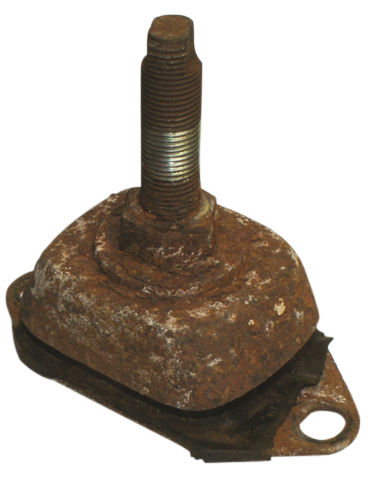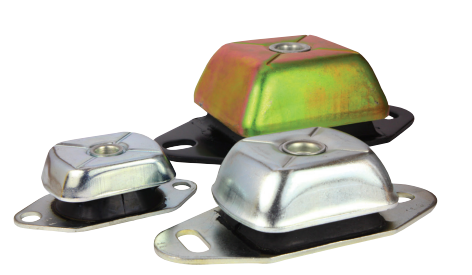
An engine mount's primary purpose is to secure an engine into machinery and absorb any shocks and vibrations. This helps to protect your equipment from damage that can reduce efficiency, operator comfort and lifespan. Within this article we will discuss how to spot bad engine mount symptoms and the top 5 signs your engine mounts need replacing.
Engine Mount Symptoms
We have all been there, everything is going fine and then suddenly your engine mount begins to worsen in performance and starts to show symptoms of deterioration. These bad engine mount symptoms can negatively affect your machinery in the long run and damage the efficiency and lifespan.
A vehicle's engine mounting system is designed to control engine movements, and prevent the disturbing vibrations of the engine from damaging nearby components. These anti vibration mounts also help to reduce wear and tear and the harmful effects of excessive vibration to the driver or operator.
It's important to regularly update and replace your existing engine mounts to keep your machinery operating to the fullest capacity.
Unsure whether you need to replace your engine mounts? Get in touch with our friendly team or read on to find out the top five signs your engine mounts need replacing.
What are the Engine Mount Failure Symptoms?
1. Excessive Noise
A common symptom of failed or deteriorated engine mountings is noise coming from the engine bay, such as knocking or clunking. Not every noise is directly related to your engine mount, but worn engine mounts can mean the engine is moving around more than normal and making contact with other components. This can particularly be the case during starting and stopping of the engine.
2. Excessive Vibration
Engine mounts are designed to securely keep an engine in place whilst stopping vibration from being transmitted to other areas of the vehicle. One of the first tell-tale signs that it's time to replace engine mounts is if you’re experiencing increased vibration. When an engine mount is damaged, its anti-vibration properties may reduce. There may be a loss of stiffness of the rubber, bonding failures, or even leaking fluid-filled mounts. In these instances, the vibration dampening effect of your engine mounting may not be working properly and can transmit the vibration and noise from the engine through to the driver, considerably reducing driver comfort.
3. Start up and Shut Down Movement
When your engine mounts have failed you may notice your vehicle lurching forward when you start the engine. This lurch then usually turns into a constant vibration, but you may then also feel a lurch when the ignition is turned off. This is due to the engine torque and loss of engine mounting stiffness or constraint, resulting in the engine moving within the engine compartment.
4. A Rough Ride
If you experience a jolt when changing gears, you may find your engine mount needs replacing. When travelling at a quicker speed, these jolts or thuds can be more noticeable. This will cause movement of the engine and can lead to damage of your engine block and other components. If not resolved, driving your vehicle can become a risk.
5. Visual Wear and Tear of Your Engine Mountings
If you can see any notable corrosion or cracks to the metal part of the engine mount, it’s possible that the integrity of the engine mounting may be compromised and may be starting to fail. Additionally, there may be leaking liquid or the engine may visibly appear to be sagging. Damage to the rubber aspect of an engine mount could limit its performance depending on the severity of the damage and the root cause. Any changes can damage the engine as the effectiveness of engine mounts relies on their stiffness, rubber hardness, shape and form. You should look into replacing engine mounts, if you notice any of these issues.

What Causes Worn Engine Mounts?
As with any part of the engine, there may be various reasons why your engine mounts may need replacing:
- Ageing Over Time
Much like every integral piece to an engine, with time and heavy usage, engine mounts will begin to deteriote with time. It is important to keep an eye on your machinery and make sure it is all in good working order.
- Poorly Installed Engine Mounts
Even though it’s possible to fit your own engine mountings, poorly installed engine mountings may fail or, at best, not last as long as they should. We’ve all heard the saying ‘pay cheap, pay twice’ so make sure you visit a reputable, qualified mechanical engineering technician that has suitable equipment to perform the job.
- Poor Driving Habits that Damage Your Vehicle Parts
Incorrect or Poor control of the vehicle can cause excessive strain and the engine mountings and potentially costly long-term damage to your vehicle. For example excessive speed over rough ground can cause excessive shock forces which will be transmitted through the engine mountings. Following correct operator procedures and driving techniques will extend the lifespan of your engine mounts and along with vehicle components.
- When Your Vehicle Has Been Involved in a Crash
If a vehicle has been involved in an accident, as well as the obvious damage, there may be internal damage within the engine. Sudden impacts will cause excessive shock forces to be passed through the engine mountings which can cause rubber and bonding failures, so, always check for hidden issues as well as superficial ones. Likewise, make sure your vehicle has been thoroughly checked and follows the specified service schedule.
- Fluid Leaks onto the Engine Mounts
Leaks in any motor vehicle should be dealt with immediately. Engine oil that has leaked onto engine mounts could cause rubber to soften and fail. Most often, engine mountings are manufactured in Natural rubber, however certain applications will require synthetic materials to protect from the outside environment such as fluids and heat. Fuel and Oil will attack natural rubber and break down the mechanical properties such as the mounting stiffness.

What Happens if I don’t Replace Engine Mounts When They are Faulty?
All engine mounts will wear and fail over time and not replacing engine mountings could lead to the following:
-
Excessive Vibration
-
Damage or Wear to the engine
-
Damage or Wear to other components in the engine
Engine mounts should regularly be checked during your vehicle’s service schedule. As a rule of thumb, if one fails, it is sensible to replace them all. A failed engine mount will put additional strain on the remaining intact engine mounts.
How Can AV Industrial Products Help With Your Bad Engine Mounts
Here at AV Industrial Products Ltd, we can supply engine mounts for a range of different vehicles, such as Construction and Off-Highway Vehicles, Agricultural Vehicles and Road Going specialist vehicles. We also offer vibration testing and analysis to improve your equipment's efficiency. For any information or support, contact our highly-experienced team and we will be able to provide you with technical advice and help with your Engine mounting selection.




